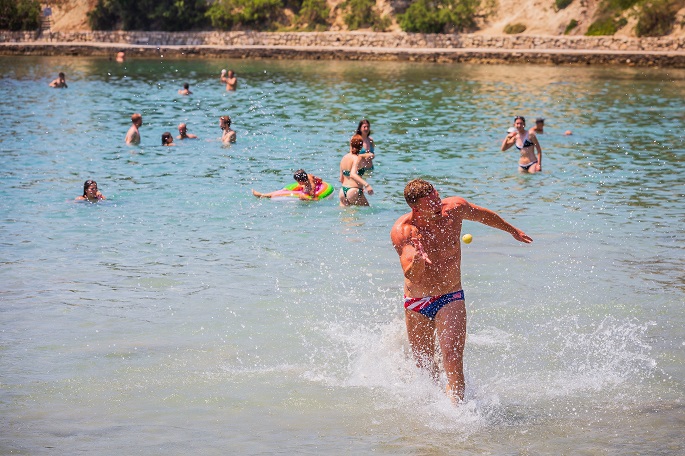Southern Europe swelters in scorching temperatures
Published : 17 Jul 2024, 00:35
Many countries in southern Europe are grappling with sweltering weather and escalating health and fire risks this week as an intense heatwave sweeps across the region, pushing temperatures above 40 degrees Celsius in some areas, reported Xinhua.
The extreme heat has caused at least one death in Albania, where high temperatures are expected to reach 43 degrees Celsius on Friday. According to local media reports, a 72-year-old man was found dead at his farm Tuesday morning in Memaliaj, 200 km south of the capital Tirana. The cause of his death is believed to be related to the heat.
In Italy, following at least five heat-related deaths over the weekend, the health ministry has placed 12 major cities under its most severe heat warning, as temperatures have reached 40 degrees Celsius -- with the worst still to come.
"We are melting on the road," said a tourist in Bascarsija, the old bazaar in the old town of Sarajevo, the capital of Bosnia and Herzegovina, giving only her family name as Liang. The Federal Hydrometeorological Institute has forecast high temperatures of up to 41 degrees in some areas.
In Serbia, where temperatures ranged from 36 to 41 degrees Celsius on Tuesday, meteorologist Slobodan Sovil has forecast yet another influx of very hot air from North Africa, which will once again push maximum temperatures to around 40 degrees Celsius from July 22 to 24. "Overall, July 2024 has the potential to become the hottest and to record the most intense heatwave in the history of our country," Sovil said in a social media post.
Greece is also bracing for extreme temperatures this week. On Tuesday, temperatures hovered between 39 and 41 degrees Celsius in the continental areas, with some locations in the west and north hitting 42 degrees.
The sweltering weather is expected to escalate on Wednesday and Thursday, with maximum temperatures projected to hit 42 degrees in the interior of the Greek mainland. In the western, central and northern areas, the mercury is likely to reach 43 degrees.
There is a very high fire risk on Wednesday in Attica, Peloponnese, Sterea Ellada, Western Greece, Northern Aegean, Eastern Macedonia and Thrace regions, according to the fire danger forecast map issued by the General Secretariat for Civil Protection at the Climate Crisis and Civil Protection Ministry.
The General Secretariat has advised state and local services in these areas to be on alert and step up aerial and ground patrols. There will also be a precautionary ban on the circulation of vehicles and people within national parks, forests and high-risk areas.
In Croatia, citizens and tourists are also battling with heat this week, with maximum temperatures expected to reach 40 degrees. According to meteorologist Zoran Vakula, "2024 will definitely be one of the five hottest years in Croatia's history."
Meanwhile, the heatwave in Slovenia has dragged into its second week, with no signs of cooling down for at least another week, according to a forecast by the national Agency of Environment, Climate and Energy (ARSO).
According to the ARSO, sea temperatures in the port city of Koper, around 100 km from the Slovenian capital Ljubljana, reached 29.8 degrees on Tuesday and could in the coming days reach the all-time high recorded in July 2010, when the sea temperature rose to 31.1 degrees.
In Bulgaria, where temperatures exceeded 40 degrees in many areas, caretaker Prime Minister Dimitar Glavchev has established a task force to combat the wildfires that are raging at several sites, destroying farmlands, forests and vegetation.
In the Bulgarian town of Svilengrad, tens of thousands of hectares of forest and agricultural land have been destroyed, according to local media reports. Fishermen complain that due to the record high temperatures driving fish into the deeper waters of the Black Sea, some fish species, including safrid, have become scarce since the end of June.


